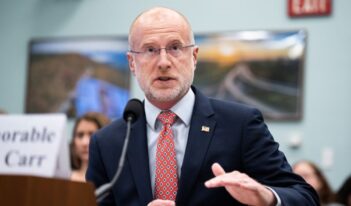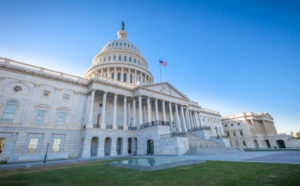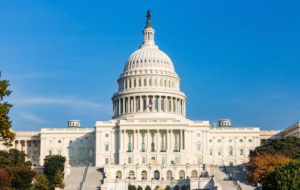
The Supreme Court considers conversion therapy ban, the federal shutdown continues, and more…
IN THE NEWS
- The U.S. Supreme Court heard oral arguments in a First Amendment challenge to a 2019 Colorado law banning conversion therapy for minors by licensed mental-health providers. The ban, which has been upheld by lower courts, prohibits conversion practices, citing evidence of harm and increased suicide risk, while allowing therapies that promote acceptance. The plaintiff, a Christian counselor, argued that the ban discriminates against her religious views and treated therapy as protected speech subject to strict scrutiny. Colorado contended that it can regulate harmful, ineffective treatments according to its authority over health care standards. A majority of conservative justices reportedly appeared skeptical of the ban, questioning viewpoint discrimination and suggesting remand for stricter review, which could potentially result in the invalidation of similar bans in over 20 states.
- The Office of Management and Budget (OMB) reportedly issued a draft memo stating that backpay for furloughed federal workers during a shutdown is not guaranteed. In the memo, OMB reportedly argued that the Government Employee Fair Treatment Act of 2019, passed during the last government shutdown, is not “self-executing.” Rather, OMB reportedly stated, Congress must specifically appropriate funds to pay furloughed workers. This interpretation directly conflicts with recent guidance from the Council of Economic Advisors and the Office of Personnel Management, however. In opposition to OMB’s memo, U.S. Senator Patty Murray (D-Wash.) stated that refusing to grant backpay to furloughed federal workers “flies in the face of the plain text of the law.”
- The Centers for Disease Control and Prevention (CDC) approved a recommendation from the Advisory Community on Immunization Practices (ACIP) that permits people of all ages to receive the COVID-19 vaccine after consulting with a health provider. Policies approved by the CDC are immediately adopted for Medicare and Medicaid beneficiaries, as well as for users of the Vaccines for Children Program. Because private insurers must cover vaccines recommended by ACIP, this move also appears to preserve insurance coverage for COVID-19 vaccines. In support of this policy, acting CDC Director Jim O’Neill stated that “informed consent is back.”
- A federal judge vacated a policy on teen pregnancy prevention grants issued by the Department of Health and Human Services in July, finding it “fatally vague” and in violation of the Administrative Procedure Act. The policy required grant recipients to avoid “radical gender ideology” and diversity, equity, and inclusion content, aligning with President Donald J. Trump’s executive order on LGBTQ+ issues. Planned Parenthood affiliates challenged the policy, arguing that it conflicted with congressional mandates for evidence-based programs. Supporters of the policy praised it for protecting parental rights, while critics warned it would undermine effective public health initiatives and risk over $100 million in funding. The decision preserves access to grants for nonprofits, tribes, and health departments, potentially averting clinic closures and reduced teen pregnancy prevention efforts.
- California Governor Gavin Newsom signed a law preventing commercials on streaming platforms from being louder than the video content itself. Although the Federal Communications Commission (FCC) requires television commercials to have the same average volume as the programs they accompany, this federal rule does not apply to streaming platforms. The California law is aimed at addressing what the FCC has described as a “troubling jump” in complaints about the volume of commercials.
- President Trump directed the Bureau of Land Management, National Park Service, and the U.S. Army Corps of Engineers to issue all permits necessary to authorize the Ambler Road Project, a proposed 211-mile industrial road in Alaska. The construction of this road would expand mining access to an area in Alaska with large deposits of critical minerals, including copper and cobalt. This announcement follows an executive order that directed agencies to review the Biden Administration’s decision to block the Ambler Road Project in order to protect at-risk wildlife and preserve lands of critical importance to Alaska Native communities. In the announcement, the White House stated that the road is “vitally important to America’s national defense and economic prosperity.”
- The Office of the Comptroller of the Currency (OCC) proposed multiple rules aimed at reducing regulatory burdens on community banks. One proposed rule would rescind the Fair Housing Home Loan Data System, which requires banks to collect and retain certain data on home loan applications. Another proposed rule would simplify licensing requirements for corporate activities and transactions involving community banks. The OCC also clarified examination procedures and expectations for community banks in order to reduce regulatory oversight.
- The UK Financial Conduct Authority proposed a redress scheme for consumers who were overcharged on motor finance deals involving discretionary commission arrangements, which were banned in the United Kingdom in 2021. The plan would require firms to identify affected borrowers from 2007 to 2021 and, following investigations into unfair practices, provide them with compensation, potentially costing lenders billions. Supporters praised the move for enhancing consumer protections and market fairness, while critics warned it could strain industry finances amid economic pressures. Discussion of the proposed scheme runs until December 2025, with implementation expected in 2026.
WHAT WE’RE READING THIS WEEK
- In a recent Brookings Institution essay, Tom Wheeler, a visiting fellow at the Center for Technology Innovation at Brookings, argued that the use of political power to protect American technology companies from regulatory oversight can be seen as a “digital” version of mercantilism—an economic policy used to shield favored companies. Wheeler explained that President Trump has protected American technology companies by allowing them to avoid penalties for violating user privacy, spreading misinformation, and engaging in anticompetitive behavior. In contrast, the European Union (EU) has pushed back against American technology companies with new legislation designed to protect competition in online markets. Wheeler concludes that this modern-day mercantilism is also evident in Trump’s demands, posted on TruthSocial, that the EU show respect to American tech companies and end its digital market regulations.
- In an article published in the Harvard Journal on Legislation, Jody Freeman and Matthew C. Stephenson, professors at Harvard Law School, examined the Congressional Review Act (CRA) as a tool for regulatory oversight. They argued that Congress could streamline legislative processes by leveraging the CRA’s “disapproval” mechanism to nullify agency rules—especially major regulations—more effectively. Stephenson and Freeman highlighted underutilized CRA provisions, such as expedited Senate procedures, that could enhance accountability without disrupting agency functions. They recommended reforms to clarify the CRA’s scope and encourage its strategic use to balance executive overreach and legislative authority in regulatory governance.
- In a recent Brookings Institution essay, Marta Wosińska, a senior fellow at the Center on Health Policy, argued that the U.S. Food and Drug Administration (FDA) system for ensuring consistent drug quality must be reformed to address problems posed by increasing globalization of pharmaceutical supply chains and limited resources both at FDA and at the individual manufacturer level. Wosińska proposed that pharmaceutical importers designate a “Qualified Person” who is tasked with certifying that each batch of pharmaceutical products satisfies the Current Good Manufacturing Practices standards upon importation. She explained that this system, which has already been adopted in the European Union, would increase the likelihood that noncompliance is detected and that manufacturers receive appropriate consequences for violating standards. Wosińska cautioned, however, that policymakers must carefully define the liability exposure for the “Qualified Person” for this system to be successful in the United States.
EDITOR’S CHOICE
- In an essay in The Regulatory Review, Keith Bradley, a partner at Squire Patton Boggs, argued that, during a government shutdown, agencies with appropriations should be allowed to use U.S. Department of Justice attorneys to defend the government in civil cases, even when the Justice Department lacks adequate appropriations. Bradley explained that, during the 2019 partial government shutdown, many agencies remained funded, but the Justice Department did not, resulting in delays in active civil cases and unexpected costs for those litigating against the government. Bradley supported his position with policy considerations, noting that, in such civil cases, the appropriated agency is the party more directly interested in the litigation. Bradley also cited support from the U.S. Government Accountability Office and legal authority from the Economy Act.



